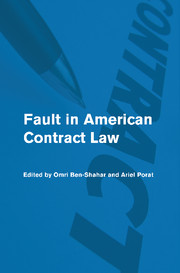Book contents
- Frontmatter
- Contents
- List of Contributors
- Preface
- Acknowledgment
- I THE CASE FOR STRICT LIABILITY
- 1 Let Us Never Blame a Contract Breaker
- 2 In (Partial) Defense of Strict Liability in Contract
- 3 The Fault Principle as the Chameleon of Contract Law: A Market Function Approach
- II THE CASE FOR FAULT
- III BETWEEN STRICT LIABILITY AND FAULT
- IV WILLFUL BREACH
- V COMPARATIVE FAULT
- VI THE MORALITY OF BREACH
- Case Index
- Subject Index
- References
2 - In (Partial) Defense of Strict Liability in Contract
Published online by Cambridge University Press: 10 November 2010
- Frontmatter
- Contents
- List of Contributors
- Preface
- Acknowledgment
- I THE CASE FOR STRICT LIABILITY
- 1 Let Us Never Blame a Contract Breaker
- 2 In (Partial) Defense of Strict Liability in Contract
- 3 The Fault Principle as the Chameleon of Contract Law: A Market Function Approach
- II THE CASE FOR FAULT
- III BETWEEN STRICT LIABILITY AND FAULT
- IV WILLFUL BREACH
- V COMPARATIVE FAULT
- VI THE MORALITY OF BREACH
- Case Index
- Subject Index
- References
Summary
Many scholars believe that notions of fault should and do pervade contract doctrine. This chapter argues that contract liability is strict liability at its core. This core regime is based on two key prongs: (1) the promisor is liable to the promisee for breach, and that liability is unaffected by the promisor's exercise of due care or failure to take efficient precautions; and (2) the promisor's liability is unaffected by the fact that the promisee, prior to the breach, has failed to take cost-effective precautions to reduce the consequences of nonperformance. The chapter offers two complementary normative justifications for contract law's stubborn resistance to considering fault in either of these instances. First, it argues that there are unappreciated ways in which courts' adherence to strict liability doctrine at the core of contract reduces contracting costs. In addition, it argues that a strict liability core best supports parties' efforts to access informal or relational modes of contracting, especially where key information is unverifiable.
Introduction
The Restatement's oft-quoted assertion about the nature of contract liability is one of the most imprecise generalizations ever made about the common law of contract. Numerous scholars have pointed out that, in fact, many notions of fault infuse contract law, ranging from prescriptions against intentional “bad behavior” to assessments of the reasonableness of an actor's behavior in assessing both liability and damages. But while there are, indeed, many “fault lines” in contract, speaking at that level of generality has little analytic purchase.
- Type
- Chapter
- Information
- Fault in American Contract Law , pp. 20 - 34Publisher: Cambridge University PressPrint publication year: 2010
References
- 1
- Cited by



